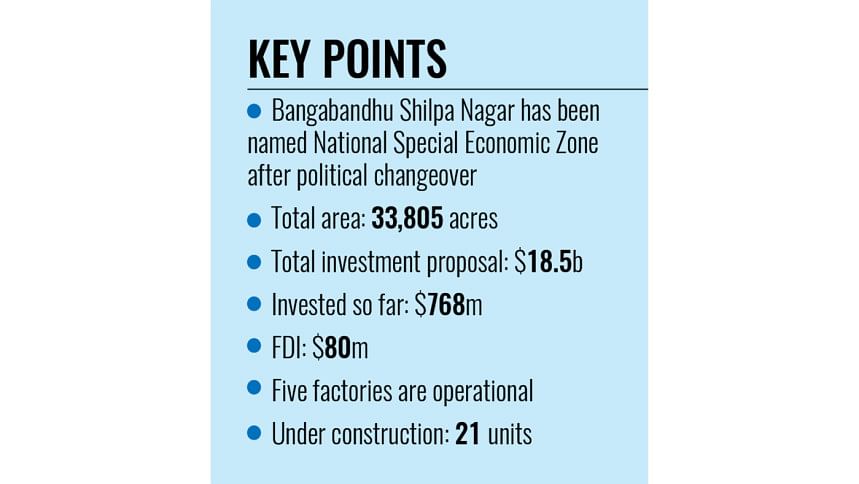Focus now on one exemplary economic zone, not 100

Bangladesh will focus on properly setting up one economic zone, offering all amenities and utilities and complying with environmental standards, instead of 100, according to Ashik Chowdhury, executive chairman of the Bangladesh Economic Zones Authority (Beza).
This single economic zone will set a benchmark for future developments, he said yesterday.
"We do not need to set up 100 economic zones at this moment. Rather, we will focus on an economic zone, where we will put in the effort so that we can provide all amenities for investors and workers," he added.
Chowdhury was addressing a workshop on an environmental and social impact assessment of the National Special Economic Zone (NSEZ), formerly known as Bangabandhu Sheikh Mujib Shilpa Nagar, in Chattogram.
Beza organised the event at the Pan Pacific Sonargaon Dhaka.
Employment generation was one of the biggest challenges in Bangladesh and the government cannot absorb all the human resources every year, said Chowdhury, also the executive chairman of Bangladesh Investment Development Authority (Bida).
So, there is a huge gap between the absorption and generation of human resources.
This was what led to the decision of setting up economic zones, for the creation of employment opportunities, he said.
In the past, Beza failed to timely deliver on promises made to investors.
But Beza has been set up anew to deliver zones equipped with all amenities and utilities, like gas and power, to meet the needs of industries of investors.
"We are emphasising on a flagship zone, for which World Bank is giving us support, with global standard environment protection," Chowdhury said.
Lamiya Morshed, principal coordinator for SDG affairs of the Chief Adviser's Office, laid emphasis on periodic monitoring reports for ensuring the implementation of environmental protection plans for economic zones.
She stressed on the need for adopting social and environmental impact programmes and consultations within a timeframe, reasoning that it was pivotal for achieving the Sustainable Development Goals (SDG).
"We need to work together to generate jobs and safeguard the environment for the benefit of future generations," she said.
Almost everything has been incorporated in the environmental and social impact assessment, except for sound pollution, pointed out ASM Humayun Kabir, additional secretary to the environment, forest and climate change ministry.
The assessment should incorporate the deleterious effects of unwanted or excessive sound on human health, wildlife, and environmental quality, he said.
Environment conservation gets a lot of focus prior to the implementation of big projects but get forgotten afterwards, he said, citing his experience.
Kabir also suggested conducting proper feasibility studies beforehand to prevent the wastage of public money.
The environmental and social impact assessment provided an 18-point recommendation.
They include adopting air, water and emission quality monitoring programmes, establishing a fully functional and cost-effective central effluent treatment plant and energy-efficient structures, and use of low-emission building materials.
At least 10 million people will benefit directly and indirectly from the NSEZ, on condition the recommendations are adopted, the assessment said.
Abdullah Al Mahmud Faruque, project director of the NSEZ, and Saleh Ahmed, executive member of Beza, were present.

 For all latest news, follow The Daily Star's Google News channel.
For all latest news, follow The Daily Star's Google News channel. 



Comments